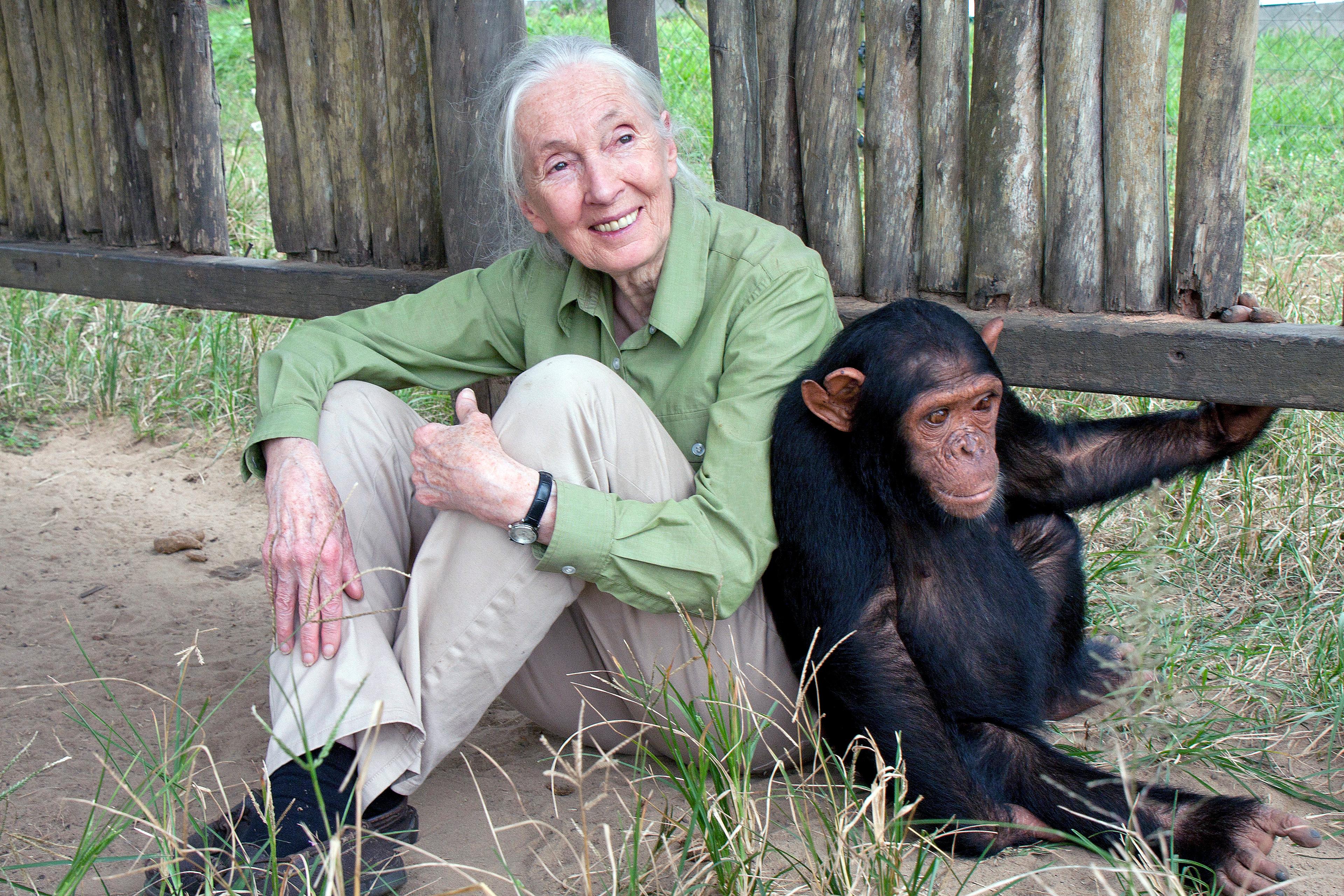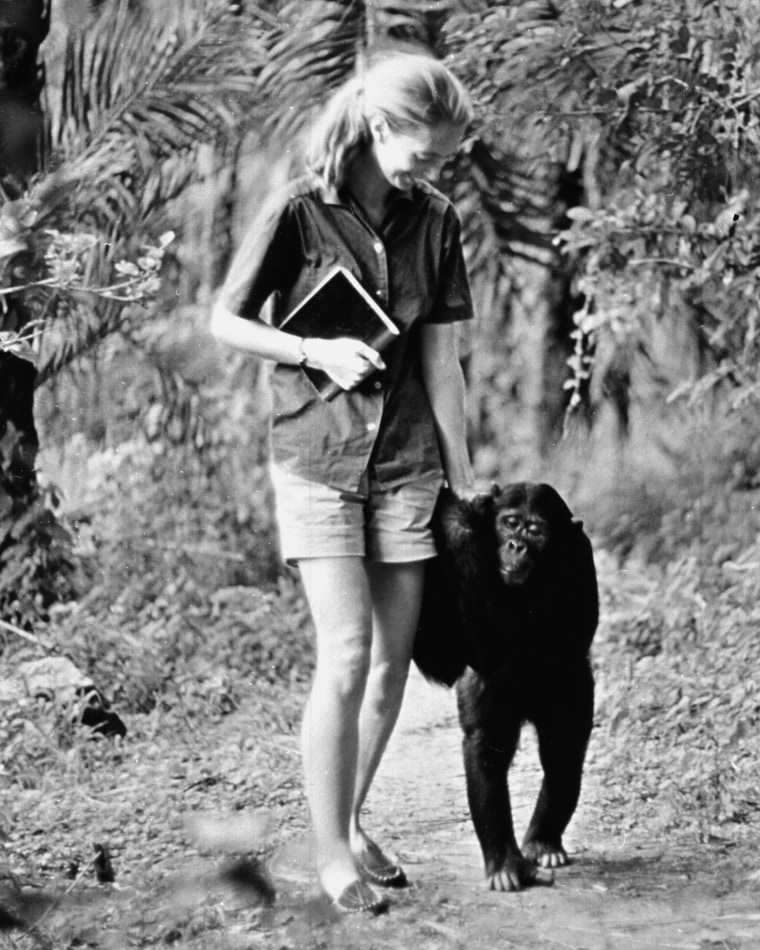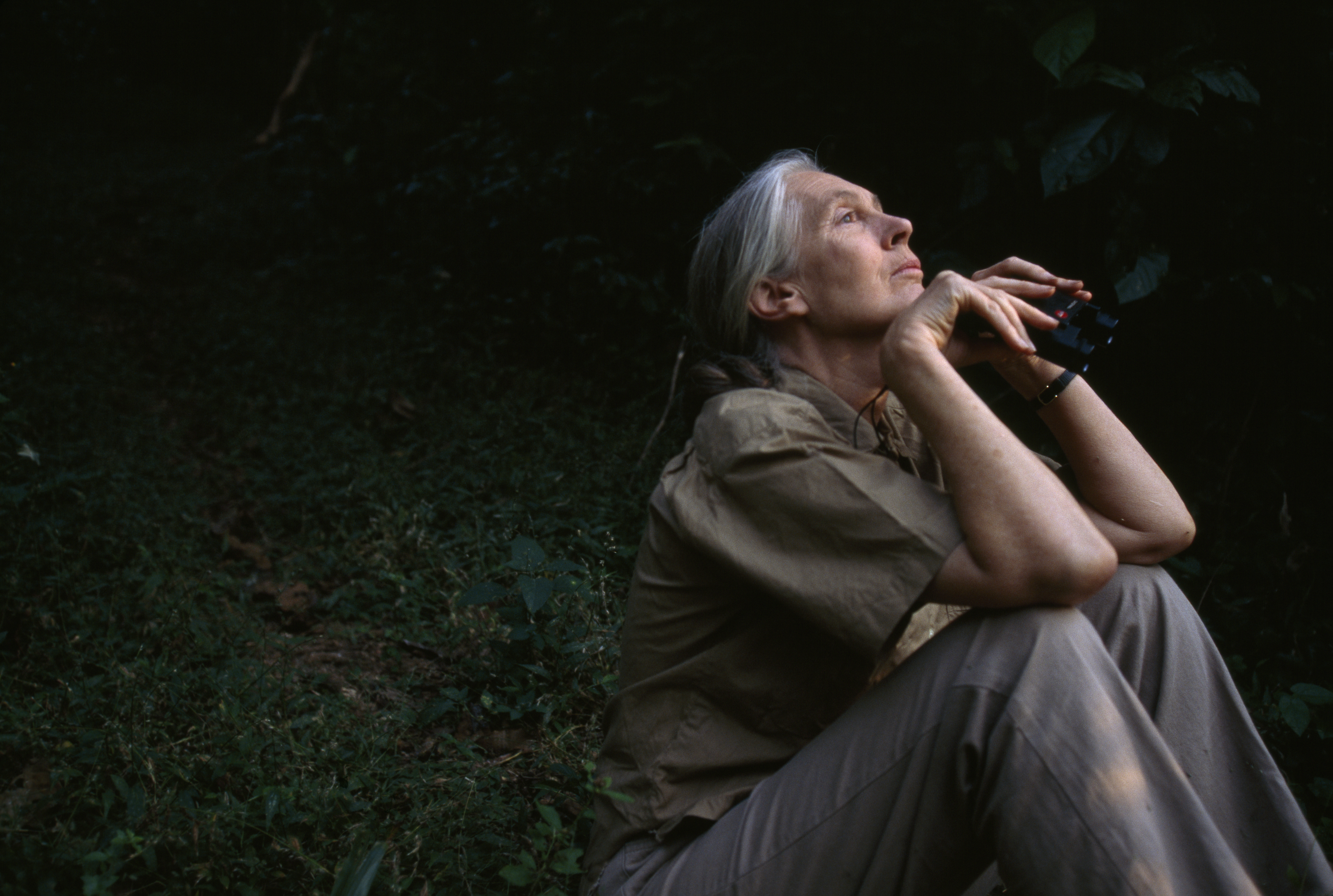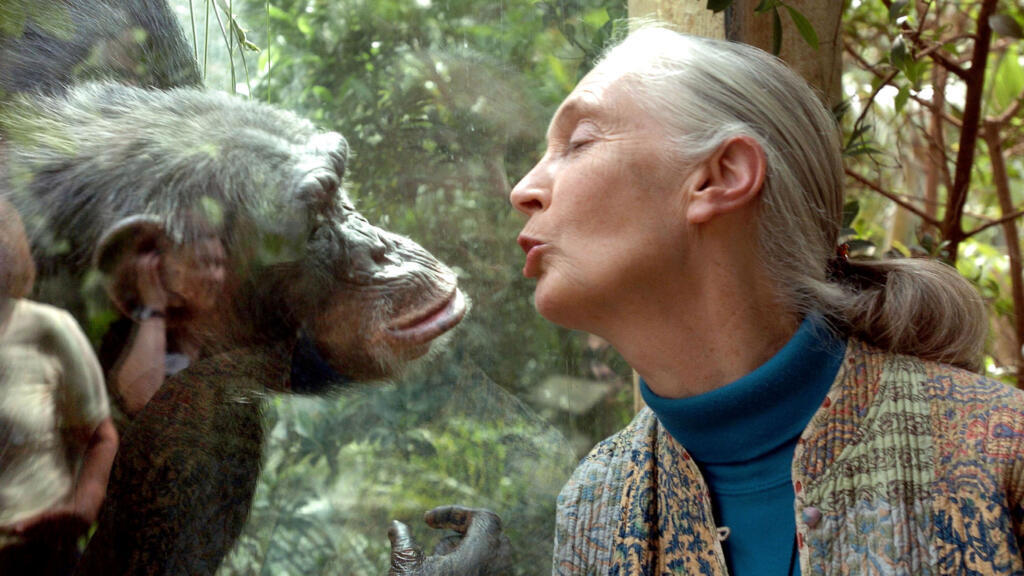
Jane Goodall
English zoologist and primatologist
Who was Jane Goodall?
An English primatologist and anthropologist, Goodall was regarded as one of the world’s foremost experts on chimpanzees. Drawn to animals since childhood, in the 1960, without any academic training in the area, Goodall travelled to explore the forests of Gombe Stream Natio nal Park in Tanzania to observe chimpanzees in the wild. She named them instead of following the norm of numbering them, and made numerous observations that questioned prevalent beliefs about the apes, asserting that chimpanzees too were capable of social interactions.
nal Park in Tanzania to observe chimpanzees in the wild. She named them instead of following the norm of numbering them, and made numerous observations that questioned prevalent beliefs about the apes, asserting that chimpanzees too were capable of social interactions.
In 1962, without a bachelor’s degree, she was allowed to enroll at the University of Cambridge to pursue a PhD in ethology. She completed her thesis in 1966 on the subject Behaviour of free-living chimpanzees, that included observations made during her initial study at the Gombe Reserve. The discoveries drastically changed the way the animals were studied and revealed close evolutionary relationship between chimpanzees and humans.
In 1977, she founded the Jane Goodall Institute (JGI), a global wildlife and environment conservation organisation that supports wildlife research and education, and protects chimpanzees and other primates by supporting sanctuaries and law enforcement efforts.
Credited with noticing human-like behaviours amongst chimpanzees, Goodall was also the UN Messenger of Peace and honorary member of the World Future Council.
In 2022, Mattel launched a new Barbie doll modelled after Jane Goodall ahead of World Chimpanzee Day. The Goodall doll is made from 75 per cent recycled ocean-bound plastic, in keeping with the ethologist’s focus on protecting the environment.
Dressed in field attire and equipped with a pair of binoculars and notebook, the Barbie launched as part of the “Inspiring Women” series was accompanied by Goodall’s most well-known research subject, David Graybeard, a grey-chinned chimpanzee who she first began interacting with after she went to Gombe Stream National Park in Tanzania in 1960.
She welcomed the announcement and said, “Girls don’t want just to be film stars and things like that; but many of them, like me, want to be out in nature studying animals. And so a Barbie doll who’s Jane is a super idea.”
She notes how once you get out into nature, you are fascinated and want to learn about it and protect it.
The world lost a legend as Dame Jane Goodall passed away at age 91. Her death marks the culmination of a life that rewrote humanity’s place in nature. But it was her life that we can all learn from, offering a wake-up call of sorts for business leaders to follow in her footsteps in three distinct ways: by embedding empathy, practicing humility, and committing to a long-term vision.
Born in London, Jane had a childhood fascination with animals. It was this passion that would become her life’s work. With no formal scientific credentials, she traveled to Tanzania in 1960 under the mentorship of anthropologist Louis Leakey and began observing chimpanzees in the wild at the Gombe Stream. For almost two decades, she observed and documented behaviors that challenged the foundations of scientific thoughts around chimpanzees' intelligence - they used tools, went on the hunt for meat, and had individualized personalities that they used to form emotional bonds.

She would go on to create the Jane Goodall Institute in 1977, becoming a global ambassador and icon for animal conservation and climate action, with the hope and conviction that even small acts of kindness could have a ripple effect, ultimately leading to change.
Today, business leaders can learn from her by following these three lessons as a simple blueprint for honoring her legacy.
1. Empathy First
One of Goodall’s most notable and transformative acts was to give chimpanzees names instead of assigning them numbers. She insisted each primate had its own relationships and emotions with others. By recognizing that they possessed inner lives, she compelled others in her space, and eventually the public at large, to view animals not as data or numbers, but as relatable subjects of concern.
In business, many leaders do the same. As enterprises scale, it's easy to treat employees, customers, and partners as metrics or line items - not individuals. But empathy first demands the opposite: seeing people as complicated, feeling beings. That means listening more than measuring, creating environments for vulnerability, and designing a culture that responds humanely to stress, failure, and inequity. When leaders adopt empathy as a strategy, they not only inspire loyalty — it is that psychological safety that leads to increased creativity through trust and resilience.
The world lost a legend as Dame Jane Goodall passed away at age 91. Her death marks the culmination of a life that rewrote humanity’s place in nature. But it was her life that we can all learn from, offering a wake-up call of sorts for business leaders to follow in her footsteps in three distinct ways: by embedding empathy, practicing humility, and committing to a long-term vision.
Born in London, Jane had a childhood fascination with animals. It was this passion that would become her life’s work. With no formal scientific credentials, she traveled to Tanzania in 1960 under the mentorship of anthropologist Louis Leakey and began observing chimpanzees in the wild at the Gombe Stream. For almost two decades, she observed and documented behaviors that challenged the foundations of scientific thoughts around chimpanzees' intelligence - they used tools, went on the hunt for meat, and had individualized personalities that they used to form emotional bonds.
She would go on to create the Jane Goodall Institute in 1977, becoming a global ambassador and icon for animal conservation and climate action, with the hope and conviction that even small acts of kindness could have a ripple effect, ultimately leading to change.
Today, business leaders can learn from her by following these three lessons as a simple blueprint for honoring her legacy.
1. Empathy First

One of Goodall’s most notable and transformative acts was to give chimpanzees names instead of assigning them numbers. She insisted each primate had its own relationships and emotions with others. By recognizing that they possessed inner lives, she compelled others in her space, and eventually the public at large, to view animals not as data or numbers, but as relatable subjects of concern.
In business, many leaders do the same. As enterprises scale, it's easy to treat employees, customers, and partners as metrics or line items - not individuals. But empathy first demands the opposite: seeing people as complicated, feeling beings. That means listening more than measuring, creating environments for vulnerability, and designing a culture that responds humanely to stress, failure, and inequity. When leaders adopt empathy as a strategy, they not only inspire loyalty — it is that psychological safety that leads to increased creativity through trust and resilience.
In business, insights necessary for innovation may not lie in boardrooms or focus groups but with frontline employees, the youngest hires, or underserved customers. Humble leaders invite dissent, ask uncomfortable questions, and are willing to debate their decisions or even have them overturned. Seeking understanding over dominance and potentially unlocking new pathways for adaptation and growth.
Now that she is gone, business leaders have a choice: revere her memory with elegance, or honor it as a blueprint. To truly honor Jane Goodall’s legacy, leaders must do more than nod to conservation or issue statements about purpose — they must adopt her empathy as a strategic lever, embed patience into their rhythms, and listen to the margins even when it unsettles their certainty.
In a world with accelerating complexity, the most significant competitiveness may not come from scale, speed, or capital — but from our capacity to see, care, and lead with moral imagination. That is the lesson Jane Goodall offered the world, and it is one business leaders should consider in these times.
Following Jane Goodall‘s death at 91, Leonardo DiCaprio is paying tribute to his friend and continuing her legacy.
The Oscar winner called Goodall “a true hero for the planet, an inspiration to millions, and a dear friend” after they served together as United Nations Messengers of Peace since his designation in 2014 and recently executive produced the movie Howl together.
“Jane Goodall devoted her life to protecting our planet and giving a voice to the wild animals and the ecosystems they inhabit,” he wrote on Instagram. “Her groundbreaking research on Chimpanzees in Tanzania transformed our understanding of how our closest relatives live, socialize, and think—reminding us that we are deeply connected not only to Chimpanzees and the other great apes, but to all life.”

DiCaprio continued, “For decades, Jane traveled the world with tireless energy, awakening generations to the wonder of the natural world. She spoke directly to the next generation
Goodall, who died of natural causes while on a U.S. speaking tour, was widely recognized for her immersive field work in Africa beginning in the 1960’s. Her observations of chimpanzees’ emotions, personalities and use of tools reshaped how the scientific
community and public viewed animals - not only primates, but all wildlife.Capitan noted that while the Anchorage facility does not house chimpanzees, Goodall’s legacy informs their work with species such as polar bears, which are both central to Alaska’s identity and being impacted by environmental pressures.“Part of the Alaska Zoo’s mission is conservation work,” Capitan said. “Right behind me is one of our polar bears, Cranberry. You know, it’s an important species to Alaska. It’s an important species here at the Alaska Zoo. And, you know, we just get a lot of visitors that come here specifically to see polar bears.
“Jane Goodall was such a pioneer in conservation - she’s definitely and idol for a lot of people up here.”
Goodall remained active into her 90’s, traveling widely to speak about environmental protections, climate change and hope for the future. She was a United Nations Messenger of Peace and a global voice for protecting ecosystems and wildlife.
Tributes poured in from world leaders, scientists, and conservation organizations following her death.
For Alaskans working in conservation, Capitan said her legacy will continue to inspire.
“Just the conservation passion and work that she has done tirelessly for the last couple of decades, was really impactful to a lot of people. And she really helped science see animals in a much different way than they had previously,” he said.
‘A visionary humanitarian’
The Duke and Duchess of Sussex have paid tribute to Dr Goodall, describing her as a “tireless advocate” for the protection of nature.
“Dr Jane Goodall DBE was a visionary humanitarian, scientist, friend to the planet, and friend to us,” Prince Harry and Meghan said in a statement.
Actor and environmental campaigner Leonardo DiCaprio called her “a true hero for the planet”.
“For decades, Jane travelled the world with tireless energy, awakening generations to the wonder of the natural world,” DiCaprio said.
“She inspired millions to care, to act, and to hope.”
Former Canadian prime minister, Justin Trudeau, said “her compassion will live on” in future conservation work.
Environmental organisations, including Greenpeace and People for the Ethical Treatment of Animals (Peta), have also commemorated Dr Goodall’s legacy.
Posted on 2025/10/02 09:07 AM
